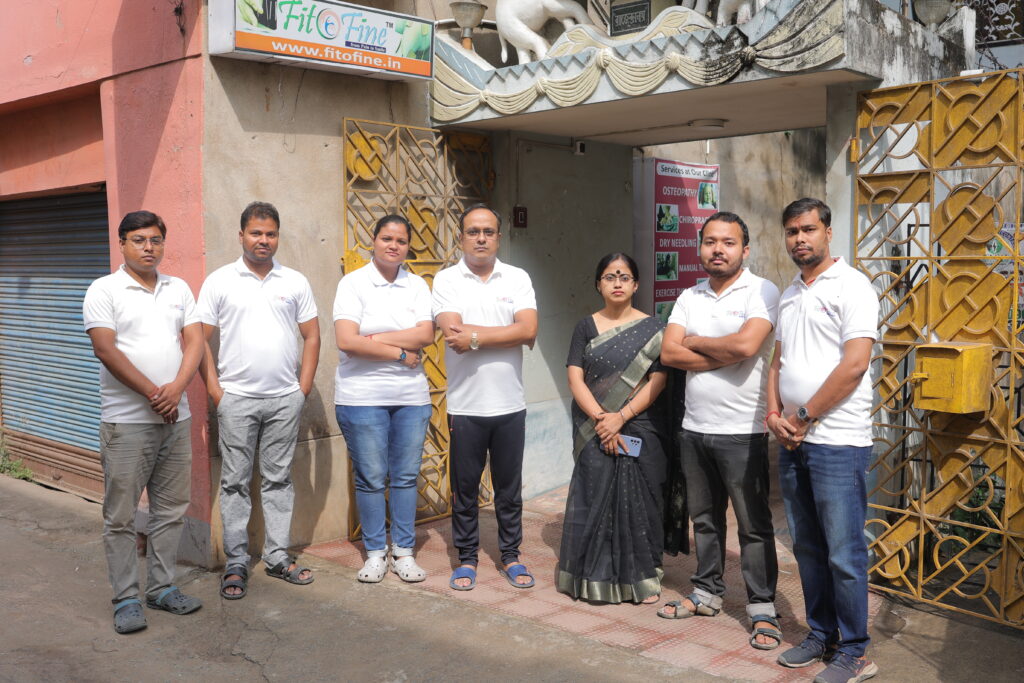Pediatric Physiotherapy: Helping Children Develop Stronger Bodies
Empowering Children Through Movement, Play, and Expert Care
Pediatric physiotherapy is more than just treatment, it’s a journey of growth, healing, and playful learning. At FitoFine Physiotherapy Clinic, we understand how every child is unique, and that’s exactly how we design our therapy plans: personalized, compassionate, and backed by science.
From helping infants with developmental delays to supporting children recovering from surgery or injury, pediatric physiotherapy empowers kids to move, grow, and thrive. If you’re a parent looking for expert pediatric physiotherapy, here’s everything you need to know.

What is Pediatric Physiotherapy?
Pediatric physiotherapy is a specialized form of physical therapy aimed at infants, children, and adolescents who have difficulty with movement or physical development. It focuses on:
- Improving gross motor skills like crawling, walking, and running
- Building muscle tone and strength
- Enhancing posture, coordination, and balance
- Supporting recovery after surgery or injury
- Encouraging independence in daily activities
It’s not only for children with complex medical needs, even mild delays in physical development can benefit from early therapeutic intervention.

Common Conditions Treated by Pediatric Physiotherapists
Children may face movement challenges due to various health conditions. Pediatric physiotherapists at FitoFine work with kids experiencing:
- Cerebral palsy
- Muscular dystrophy
- Spina bifida
- Down syndrome
- Developmental delays
- Torticollis (tight neck muscles)
- Clubfoot
- Flat feet or abnormal walking patterns
- Balance and coordination issues
- Post-surgical and post-fracture rehabilitation
We collaborate closely with families, doctors, and other specialists to develop a custom therapy plan that suits your child’s needs.

Introduction and Background
Pediatric physical therapy is a specialized branch of physiotherapy aimed at supporting motor development and managing movement-related issues in infants, children, and adolescents. It encompasses conditions affecting orthopedic, neurological, respiratory, and congenital systems, including prematurity-related complications [1]. Pediatric physiotherapists are trained to evaluate, diagnose, and treat neuromotor and developmental disorders across age groups, applying condition-specific knowledge to optimize growth and function [2].
Several therapeutic approaches are commonly used, as summarized in Table 1. These include the Bobath approach for neurodevelopmental facilitation, motor learning strategies for cerebral palsy, and techniques such as Rood, Doman-Delecto, and Kabat-Knott-Voss, which emphasize sensory stimulation, sequential movement, and neuromuscular re-education.
Table 1. Common treatment approaches in pediatric physiotherapy
| Technique | Description |
|---|---|
| Bobath approach | Enhances developmental stages, corrects abnormal posture, and improves sensory input |
| Motor learning | Applied primarily in infants with cerebral palsy |
| Rood approach | Uses superficial and deep stimulation to activate motor activity |
| Doman-Delecto technique | Employs repetitive movement patterns to activate dormant CNS pathways |
| Kabat-Knott-Voss technique | Uses functional movement patterns to improve proprioceptive neuromuscular facilitation |
Given the complex needs of pediatric patients, physiotherapists often collaborate with specialists from medicine, nursing, education, psychology, occupational therapy, and speech therapy [3,4]. In India, pediatric physiotherapy is still evolving, but its scope has broadened considerably in recent years [5,6].

Pediatric Conditions in Focus
Pediatric physiotherapy addresses a wide range of congenital and acquired conditions (Table 2), including preterm birth, cerebral palsy, torticollis, spina bifida, autism spectrum disorder (ASD), Down syndrome, attention-deficit hyperactivity disorder (ADHD), Erb’s palsy, and acute respiratory distress syndrome (ARDS) [7–9].
Table 2. Selected conditions addressed in pediatric physiotherapy
- Preterm infants: Born before 37 weeks; categorized as very, extremely, or moderately preterm.
- Cerebral palsy: Impairs mobility, posture, and coordination, often presenting in early childhood.
- Torticollis: Abnormal head/neck posture due to muscular or congenital causes.
- Spina bifida: Neural tube defect affecting spinal cord development.
- ASD: Neurodevelopmental condition with social and behavioral impairments.
- Down syndrome: Chromosomal disorder with characteristic features and developmental delays.
- ADHD: Neurobehavioral condition affecting attention and executive function.
- Erb’s palsy: Brachial plexus injury at birth, often due to shoulder dystocia.
- ARDS: Respiratory failure due to lung fluid accumulation, common in preterm infants.
Review and Evidence Summary
A systematic review of recent literature (2019–2023) identified 23 key studies relevant to modern pediatric physiotherapy practices. These studies examined a spectrum of interventions, including multisensory stimulation for preterm infants [8], core stability training in cerebral palsy [13], proprioceptive and visual training for gait correction [15], and microcurrent therapy for torticollis [18]. The findings emphasize the value of evidence-based, multimodal, and individualized approaches, while highlighting the role of parental involvement and interdisciplinary collaboration.
Discussion
Pediatric physiotherapy contributes significantly across settings, from neonatal intensive care units to school-aged rehabilitation. Global data indicate that preterm birth and pneumonia remain leading causes of child mortality, underscoring the importance of interventions such as chest physiotherapy, early neurodevelopmental assessment, and multimodal sensory stimulation [31–33].
Innovative therapies, including microcurrent therapy, Vojta reflex techniques, and rehab suit training for cerebral palsy, demonstrate promising outcomes. Moreover, structured exercise programs (e.g., trampoline-based SSC exercises for Down syndrome) enhance postural control and strength. For sports rehabilitation, pediatric physiotherapists employ conditioning strategies such as agility, balance, and proprioception training to reduce injury risks [12].
Despite these advances, challenges remain. Access to services, cultural variations in practice, and resource limitations hinder widespread application. Moreover, controversies such as therapeutic touch in cerebral palsy highlight the need for standardized guidelines [5,6].
Limitations
This review provides a broad but condensed overview and may not capture the full range of pediatric physiotherapy practices. Regional disparities, socioeconomic factors, and barriers in healthcare systems are underexplored. Furthermore, emerging trends such as AI-driven rehabilitation tools and advanced wearable devices were not extensively discussed.
Conclusions
Pediatric physiotherapy plays a vital role in the management of conditions such as cerebral palsy, torticollis, spina bifida, and developmental disorders. Evidence supports the use of strengthening, stretching, neurodevelopmental, and sensory-based interventions to promote motor, cognitive, and emotional development. Modern advances—including microcurrent therapy, multimodal stimulation, and interdisciplinary care models—have improved therapeutic engagement and outcomes.
By fostering independence, confidence, and social integration, pediatric physiotherapists not only address physical impairments but also contribute to holistic child development. Greater awareness, research, and policy support are essential to expand access to pediatric physiotherapy services, ensuring a healthier future for children worldwide.

What to Expect in a Pediatric Physiotherapy Session
We believe therapy should be fun, engaging, and child-centered. A typical session at FitoFine includes:
- Thorough Assessment: Analyzing posture, joint flexibility, movement, and muscle strength
- Goal-Oriented Planning: Setting functional goals in consultation with parents
- Therapeutic Play: Exercises using toys, balancing tools, soft mats, resistance bands, etc.
- Parent Training: Teaching home-based exercises and supportive techniques
- Tracking Progress: Regular evaluations and plan updates to match your child’s improvement
Our sessions are designed to feel more like playtime than therapy, because we know kids learn best when they’re having fun.
Top Benefits of Pediatric Physiotherapy
Builds strength and coordination for better movement
Improves sitting, walking, crawling, and other motor milestones
Encourages active participation in school and sports
Reduces the need for long-term mobility aids
Enhances confidence, independence, and overall quality of life
Why Choose FitoFine for Pediatric Physiotherapy?
At FitoFine, we don’t just treat, we care. We provide child-friendly, customized physiotherapy sessions in a warm and motivating environment.
Pediatric-certified physiotherapists
Tailored treatment plans based on your child’s goals
Evening sessions for working parents (5:00 PM – 10:00 PM, Mon-Sat)
Comfortable, clean, and kid-friendly clinic
Hands-on parent guidance and continuous progress tracking
We’re here to support your child every step of the way.
Frequently Asked Questions (FAQs)
Q1. When can my child start physiotherapy?
As early as infancy! Early intervention is highly beneficial for children with developmental concerns.
Q2. Will physiotherapy hurt my child?
Not at all. Pediatric physiotherapy is safe, gentle, and designed to be fun and engaging.
Q3. How often will my child need therapy?
That depends on the condition and how your child progresses. Some individuals need short-term support, while others may require long-term care.
Q4. Do I need a doctor’s referral to start therapy?
A referral is helpful but not mandatory. You can book a consultation directly with our experts.
Q5. What if my child resists therapy?
We use play-based methods and a friendly approach to keep children motivated and comfortable.
Book a Session with FitoFine Today
Let’s help your child move toward a brighter, stronger future. Whether it’s rehabilitation, coordination issues, or developmental support, FitoFine is your trusted pediatric physiotherapy clinic.
Timings: Monday to Saturday, 5:00 PM – 10:00 PM | Sunday Closed
Call Us: +91 6295115701
Email: fitofine.in@gmail.com
Website: www.fitofine.com

FitoFine: Where healing meets happiness, and therapy feels like play. Let’s grow stronger, together.


